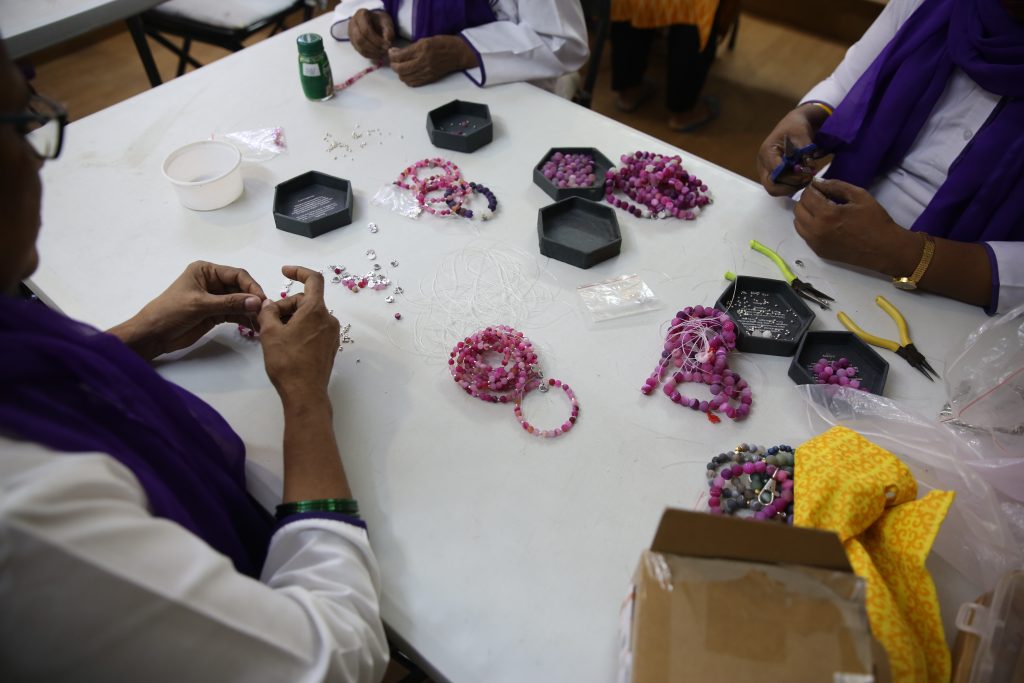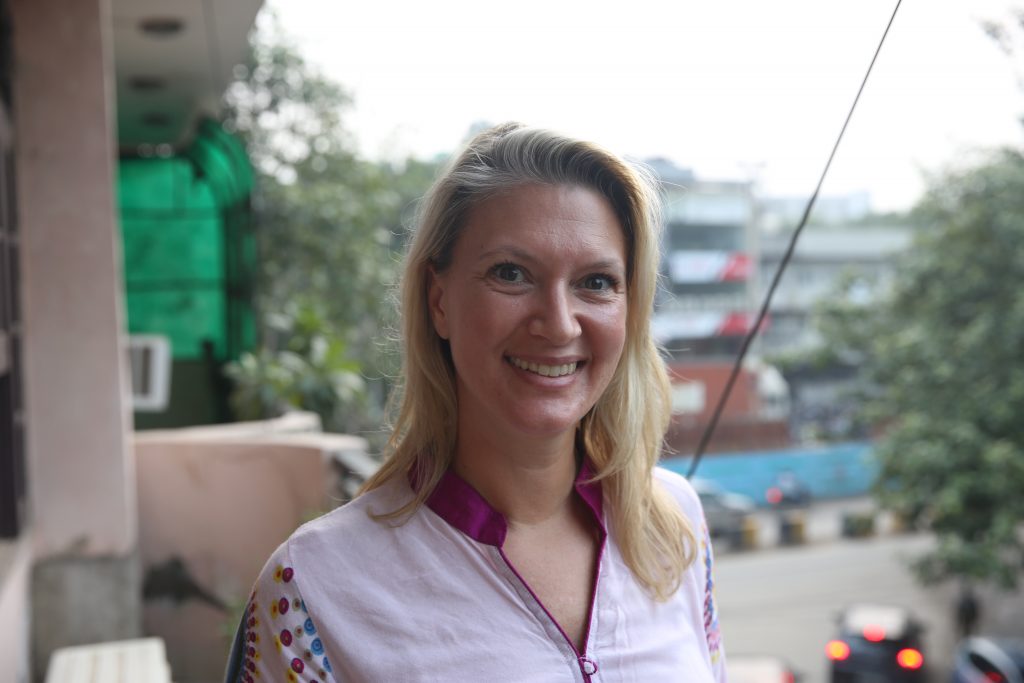Sitting in a corner wearing a spotless uniform, Jyoti is humming a tune she recently learned from her teenage daughter and threading beads onto a bracelet. The 47-year-old is a former sex worker from the brothels of Delhi’s biggest red light district — Garstin Bastion Road, also known as GB Road — who has left her previous life behind.
“I was sold to a brothel by an aunt when I was only 12 years old, so there never was any time to learn anything else or get exposure to the outside world,” she says. “With multiple waves of abuse every day, my body had become weak by the time I hit my late thirties. Plus the work had really slowed down. I was never able to save any money due to exploitation by the brothel owner and it gave me anxiety about my children’s future.”
Now, Jyoti not only has a job, she is earning enough to give her children a promising future: $250 a month through Savhera, a women-led organization that connects and provides retired sex workers with jobs. As a result of the capacity building training by Savhera, the workers have successfully launched their own collective, WePower, with technical support from Shakti Vahini, an anti-trafficking NGO. The collective aims to manufacture handmade goods that provide ongoing employment and empowerment to the women.

In May, the Supreme Court of India recognized consensual sex work as a legitimate profession, thus providing workers with dignity and equal protection under the law. The landmark ruling is a long-overdue expansion of benefits and protections to a vulnerable group of workers. But for some, like Jyoti, who are on the verge of retirement after years of unrecognized work, the ruling is little help.
To fill this gap, Savhera and similar organizations are helping aging and retired Indian sex workers transition into their new lives with jobs, bank accounts and ID cards. Now, as one of the core members of WePower, Jyoti makes handmade goods like candles, bags, and jewelry. She intends to use the money she earns to build a fund for her daughter’s future education.
“Savhera had a remarkable impact on all of our lives,” says Jyoti. “All seven of us have left our past lives, have our own bank accounts, manage finances, navigate through the transportation systems, can read and write in Hindi and even sign in English, have grown in our self-confidence, and have experienced emotional healing. We will always be indebted to Savhera.”
A way into the system
Sex workers Jyoti’s age — both active and retired — tread a perilous road. With at least three million sex workers in India, it is estimated that around a third of them are over the age of 35. A pan-India survey conducted in 2011 by the Centre for Advocacy on Stigma and Marginalization (CASAM) revealed that about 33 percent of sex workers were aged 31-40 years, six percent were aged 41-50 years and nearly one percent were over 51 years old.
Yet according to trafficked victims introduced into the sex trade at a young age, once they reach their mid-30s or 40s, demand for their work falls sharply and they are often abandoned by brothel owners. In some cases, these women are forced to become traffickers themselves. According to the UNODC, 30 percent of traffickers globally are women. “I was already considering trafficking young girls from my village only to earn enough to survive,” Jyoti says. “Now, just the thought of this makes me angry and ashamed since I have never forgotten the one who brought me here.”
“Most older sex workers end up on the streets and beg for food outside temples or turn into traffickers,” says Kiran Deshmukh, president of National Network of Sex Workers (NNSW). “The future remains bleak with no savings for old age. Since a lot of them have HIV or other sexually transmitted diseases, there is never any spare money for healthcare.”
This is why, for aging sex workers, basic life necessities like bank accounts and government ID cards — which can lead to government subsidies — are so critical to have.
Like Savhera, the Durbar Mahila Samanwaya Committee (DMSC), a group of 67,000 sex workers in West Bengal, helps aging sex workers find administrative and clerical jobs within the organization, and even runs its own bank, USHA co-operative, for sex workers without ID cards.
This bank disburses loans to workers at a much lower interest rate than public or private sector banks or local money-lenders. For many of these women, who have been duped out of their money by pimps and brothel owners, the opening of the bank has drastically improved their socio-economic status. With the bank’s passbook, they can apply for ID cards. The bank also provides support to other activities of the DMSC, which supports sex worker’s rights.
Crushed by negative news?
Sign up for the Reasons to be Cheerful newsletter.“We run a worker’s co-operative bank, run by and for sex workers, which helps them keep aside some money for their old age. This bank helps these women keep their hard-earned money safe from the eyes of pimps and brothel owners,” says Putul Halder, president of the DMSC. Durbar also helps women access the retirement pensions they are owed so they don’t have to turn to trafficking, and lobbies the government for better financial protections for sex workers.
Such protections exist in countries like Germany, Australia and the Netherlands, where sex workers are provided with health insurance and pensions. Using this as a model, Pension Parishad, a national movement for a universal old age pension in India, advocates for pensions for aging sex workers and for reducing their retirement age to 45, since they see a huge reduction in earnings in their 40s as clients seek out younger sex workers. But this also requires identity proof.

Savhera, of which Jyoti is a part, used to be run by Dr. Vanessa Bouche, a human trafficking scholar from the US, until September. It provided its members with life skills and apprenticeships, and helped put together their IDs so they could open bank accounts. It also employed them directly, operating an e-commerce website that sold wellness products, such as essential oils and jewelry, to customers in the US. The profits made on these products are then used for running the organization, which includes distributing an equal amount among all the employees. Each worker is earning at least $240 per month.
All of the women involved with Savhera have managed to leave the red light district, open their own bank accounts, manage their own finances, and learn how to read and write in English and Hindi. Their self-confidence has grown, and an emotional healing process has taken place.
“Savhera started when one of the women asked me to find her a ‘clean job’ during fieldwork,” says Bouche. “I decided to give them a platform where they are not treated as charity and feel safe. These women have everything that they need to survive, we are just helping them unlock it.”
The cooperative now known as WePower aims to manufacture handmade goods. “The idea of WePower is to create dignified employment for survivors and victims of human trafficking,” says Rishi Kant of Shakti Vahini.
Last year, after three deadly Covid-19 waves crippled the nation’s medical infrastructure led to several thousand deaths, the Supreme Court of India ordered that all sex workers be issued identity cards. These included voter cards, Aadhaar cards (12-digit individual identification number issued by the government of India), and ration cards, which allow the holder to purchase subsidized food. These cards can also help in finding employment. But since almost two-thirds of the workers don’t even appear in government census records, the cards — and their benefits — remain out of reach for many.
This is also why Savhera’s first step was to start helping the women apply for identity cards. The small step brought them closer to a life free of exploitation and being able to plan their future. For instance, 40-year-old Anjali decided to have children four years ago after she quit prostitution as she could now afford to raise children and provide them with a safe environment.
NNSW also works in eight states for the rights of sex workers and is now helping workers get their government ID cards and apply for a “labor card” which gets them at least 3,000 rupees as a pension each month.
While the struggles of aging sex workers continue, there are those who are finally beginning to see a ray of hope. Like 43-year-old Razia, a former employee at Savhera and now at WePower, who recently found her wings by being able to fulfill her childhood dream of flying on a plane by buying a ticket to her hometown with her first salary.
“As a child, I always wanted to sit in an airplane and look at the world beneath me. But sitting next to a small window in that pigeon hole brothel, I had stopped dreaming,” says Razia. “I realized my freedom and what this job had done for me, when I sat looking down in the plane. Tears kept rolling as it dawned on me that I was finally free.”








